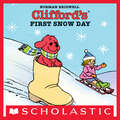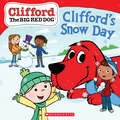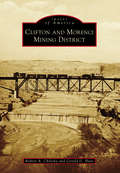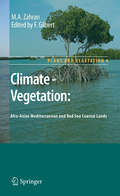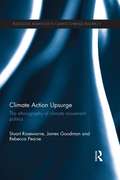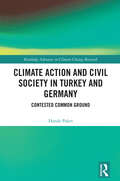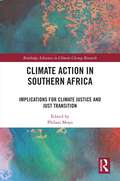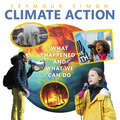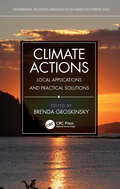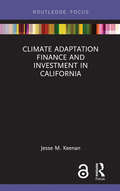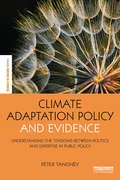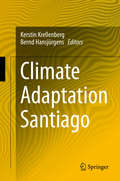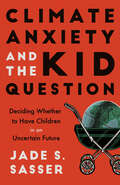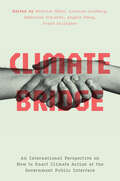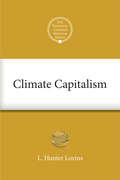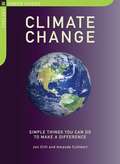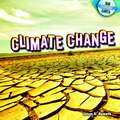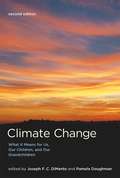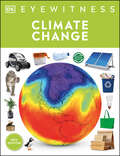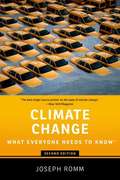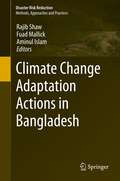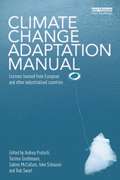- Table View
- List View
Clifford's First Snow Day (Clifford the Big Red Dog)
by Norman BridwellIt’s been snowing all night—and that means a day of fun for Emily Elizabeth and her adventurous red dog!Emily Elizabeth remembers when Clifford was a little puppy and discovered winter weather. The snow was so deep it was almost over his head. Good thing he had a fur coat to help keep him warm while he slid down the hill! With this fun-filled picture book in the wildly popular series, toddlers and early readers can join Clifford as he experiences the joys of seeing, and playing in, snow for the first time.
Clifford's Snow Day (Clifford the Big Red Dog Storybook)
by Reika ChanEnjoy a snow day with Clifford the Big Red Dog!It's a winter wonderland on Birdwell Island! After a big snowstorm, Clifford and Emily Elizabeth get their first snow day. The best friends have a blast playing Snow Rescue Squad and helping Fire Chief Franklin take care of snow duties across town.But Clifford catches a cold from his busy day outside! The big red dog can't stop sneezing and sniffling. Can his friends on Birdwell Island help him feel better?Featuring adorable art from the new TV show!
Clifton and Morenci Mining District
by Robert A. Chilicky Gerald D. HuntAcross America, from big cities to small towns and rural hamlets, there are many stories of challenges, historic events, courageous people, tragedy, and success. Some of the best and most exciting tales may not be well known. Such is the case for the towns of Clifton and Morenci, Arizona. They survived labor strikes, rising and falling copper prices, devastating floods, outlaws and lawlessness, gambling houses, and saloons. All this added to the lore that these towns were some of the roughest communities in the West. Today, after 143 years of mining, Freeport-McMoRan's Morenci copper mine is the largest in North America. Expansion has required new homes in Clifton-Morenci, a modern library, and recreational facilities. Residents are proud of their communities.
Climate - Vegetation: Afro-Asian Mediterranean and Red Sea Coastal Lands (Plant and Vegetation #4)
by M. A. Zahran Francis GilbertDeserts are unique ecosystems with their own biotic and abiotic components, and are often rich in renewable natural resources, the appropriate management of which can contribute significantly to the sustainable management of desert regions for the welfare of the people. Yet while there are many books on the flora of the countries fringing the important desert countries of the Mediterranean and Red Seas, there or few books reporting on their ecophysiology and vegetation ecology. This book presents the vegetation types of the African and Asian countries of the Mediterranean and Red Sea coastal regions, and discusses the ecological threats and economic applications of these critical resources. In particular, it examines the relationships between climate and vegetation, and discusses these within the context of desertification, agro-industrial applications, ecotourism and sustainable development. The book will provide a valuable reference for researchers and graduate students involved in plant ecology, biogeography, economic botany and environmental management in the Afro-Asian Mediterranean and Red Sea coastal regions, as well as other desert regions around the world.
Climate Action Upsurge: The Ethnography of Climate Movement Politics (Routledge Advances in Climate Change Research)
by James Goodman Rebecca Pearse Stuart RosewarneIn the late 2000s climate action became a defining feature of the international political agenda. Evidence of global warming and accelerating greenhouse gas emissions created a new sense of urgency and, despite consensus on the need for action, the growing failure of international climate policy engendered new political space for social movements. By 2007 a ‘climate justice’ movement was surfacing and developing a strong critique of existing official climate policies and engaging in new forms of direct action to assert the need for reduced extraction and burning of fossil fuels. Climate Action Upsurge offers an insight into this important period in climate movement politics, drawing on the perspectives of activists who were directly engaged in the mobilisation process. Through the interpretation of these perspectives the book illustrates important lessons for the climate movement today. In developing its examination of the climate action upsurge, the book focuses on individual activists involved in direct action ‘Climate Camps’ in Australia, while drawing comparisons and highlighting links with climate campaigns in other locales. The book should be of interest to scholars and researchers in climate change, environmental sociology, politics, policy and activism.
Climate Action and Civil Society in Turkey and Germany: Contested Common Ground (Routledge Advances in Climate Change Research)
by Hande PakerThis book explores the social and political dynamics that shape the impacts of climate change, drawing upon Turkey and Germany to offer a comprehensive comparative analysis.Civil society representatives, the climate movement, the youth, and arts and culture actors from around the world unequivocally call for a deep transformation of political, economic, and social structures in order to avoid the devastating effects of climate change. The transformation that is prescribed is perceived as insufficient, technocratic, and market-based and does not involve challenging power relations at the heart of climate action. This book addresses these concerns, using a comparative analysis to explore the issues and efficiency of a meaningful sustainable transition. The in-depth comparison of two conventionally dissimilar cases, Turkey and Germany, demonstrates that civil society actors in different political settings can use similar strategies and frames for climate action against state actors. In turn, states use similar depoliticization strategies (albeit via different mechanisms) and economic growth narratives to reproduce hegemony. The book untangles the different processes that create the contentious, politicized common ground in which these stakeholders interact with each other. The findings of this research have significant implications for many developing and developed countries alike where climate policymaking is painstakingly inadequate.This book will be of interest to students, researchers, and academics interested in political ecology, climate politics, and politics of development.
Climate Action in Southern Africa: Implications for Climate Justice and Just Transition (Routledge Advances in Climate Change Research)
by Philani MoyoUsing climate justice as an analytical tool, this volume examines the role of local mitigation and adaptation actions in Southern African in furthering climate resilient development. Climate Action in Southern Africa examines the intrinsic connection between local climate actions, climate resilient development and strides towards a just transition. The theoretical grounding in climate justice allows the authors to analyze whether current climate actions in Africa are truly effective for the poor and marginalized whose lives and livelihoods are impacted by a climate crisis largely not of their making. The authors also question the extent to which pathways to net zero carbon emissions by 2050 are achievable in Africa and ask whether this can be attained without undermining livelihoods and human development. Overall, the book argues that for any transition to be a just transition it has to be aligned with the pursuit of sustainable development and climate justice for current and future generations on the African continent. Drawing out key factors including politics, gender and migration, this volume will be of great interest to students and scholars of climate change, climate justice and African development.
Climate Action: What Happened and What We Can Do
by Seymour SimonMeet the young activists who are using their voices and minds to fight climate change. Did you know that the past five years have been the hottest ever recorded? Or that over seven million people participated in the global Climate Strike? We’re facing a very real problem, but there’s hope. Everyone is affected by climate change. Reading Climate Action: What Happened and What We Can Do is the perfect introduction not only to the dramatic effects of climate change, but to the solutions. Learn how our behavior and actions have led us to this point, hear from kids around the world dealing with extreme storms, wildfires, and sea level rise, and discover what scientists, youth activists, and ordinary citizens are doing to protect their communities. Divided into eight sections for easy browsing and with over fifty photographs, captions, charts, and graphs, this nonfiction book is an excellent choice to share in the classroom and for homeschooling for kids ages 6 and up. Also includes a glossary to supplement the text, author’s note, and index. Climate Action is the latest of Seymour Simon’s nonfiction science books. His books are regularly honored by the National Science Teacher's Association.
Climate Actions: Local Applications and Practical Solutions (Environmental and Societal Dimensions of Sustainable Development Goals)
by Brenda GroskinskyThis book offers a diverse set of solid concerted strategies in the development and implementation of specific "climate actions," in natural and built places where we all live. The book also serves as a conduit of knowledge for those who are unsure on how they can make a difference for their families, their communities, and the natural places that surround them. Through many actionable examples of mitigation efforts for the ever-present effects of climate change, especially for those who may not understand the wide range of climate action opportunities that are available. Scientists, academics, and community leaders, will find concrete examples on how they too, can develop and implement climate action solutions.
Climate Adaptation Finance and Investment in California (Routledge Focus on Environment and Sustainability)
by Jesse M. KeenanThis book serves as a guide for local governments and private enterprises as they navigate the unchartered waters of investing in climate change adaptation and resilience. This book serves not only as a resource guide for identifying potential funding sources but also as a roadmap for asset management and public finance processes. It highlights practical synergies between funding mechanisms, as well as the conflicts that may arise between varying interests and strategies. While the main focus of this work is on the State of California, this book offers broader insights for how states, local governments and private enterprises can take those critical first steps in investing in society’s collective adaptation to climate change.
Climate Adaptation Policy and Evidence: Understanding the Tensions between Politics and Expertise in Public Policy (The Earthscan Science in Society Series)
by Peter TangneyEvidence-based policymaking is often promoted within liberal democracies as the best means for government to balance political values with technical considerations. Under the evidence-based mandate, both experts and non-experts often assume that policy problems are sufficiently tractable and that experts can provide impartial and usable advice to government so that problems like climate change adaptation can be effectively addressed; at least, where there is political will to do so. This book compares the politics and science informing climate adaptation policy in Australia and the UK to understand how realistic these expectations are in practice. At a time when both academics and practitioners have repeatedly called for more and better science to anticipate climate change impacts and, thereby, to effectively adapt, this book explains why a dearth of useful expert evidence about future climate is not the most pressing problem. Even when it is sufficiently credible and relevant for decision-making, climate science is often ignored or politicised to ensure the evidence-based mandate is coherent with prevailing political, economic and epistemic ideals. There are other types of policy knowledge too that are, arguably, much more important. This comparative analysis reveals what the politics of climate change mean for both the development of useful evidence and for the practice of evidence-based policymaking.
Climate Adaptation Santiago
by Bernd Hansjürgens Kerstin KrellenbergThis book addresses the complexity of urbanization, impacts of climate change and climate change adaptation for the metropolitan region of Santiago de Chile, with a special focus on the most pressing issues of natural hazards, water and energy supply. The book exemplifies a conceptual approach for the development of adaptation measures, their evaluation and implementation in a decision support framework at the science-policy interface. It builds on scientific analyses of social and natural scientists, a participatory process with local authorities and a mutual learning network between large agglomerations in Latin America. The book is written for scholars of urban management, climate change, planning, governance and hazard research, as well as practitioners in local, regional and international organizations concerned with climate change, climate change impacts, and adaptation in metropolitan regions. While the regional focus is on Latin America the concepts and lessons learned are applicable and relevant to megacities around the world.
Climate Anxiety and the Kid Question: Deciding Whether to Have Children in an Uncertain Future
by Jade SasserThe first book-length exploration of climate-driven reproductive anxiety that places race and social justice at the center. Eco-anxiety. Climate guilt. Pre-traumatic stress disorder. Solastalgia. The study of environmental emotions and related mental health impacts is a rapidly growing field, but most researchers overlook a closely related concern: reproductive anxiety. Climate Anxiety and the Kid Question is the first comprehensive study of how environmental emotions influence whether, when, and why people today decide to become parents—or not. Jade S. Sasser argues that we can and should continue to create the families we desire, but that doing so equitably will require deep commitments to social, reproductive, and climate justice. Climate Anxiety and the Kid Question presents original research, drawing from in-depth interviews and national survey results that analyze the role of race in environmental emotions and the reproductive plans young people are making as a result. Sasser concludes that climate emotions and climate justice are inseparable, and that culturally appropriate mental and emotional health services are a necessary component to ensure climate justice for vulnerable communities.
Climate Bridge: An International Perspective on How to Enact Climate Action at the Government Public Interface
by Laurel V. HankinsClimate change is creating new challenges for spatial and environmental planning on both sides of the Atlantic. Planning and policy must balance moderating climate change impact from rising temperatures, extreme precipitation, and sea level rise with social equity and environmental justice. Climate Bridge compares New Jersey and the German Ruhr region to build an international perspective on how to enact climate action at the government-public interface. The book grew from fifteen years of collaboration between scholars in New Jersey and Germany through summer programs, a landscape architecture design studio, internships for Rutgers University students, and joint publications. Notably, settlement patterns and brownfield issues reveal similarities between the underserved in both regions. The first section compares international environmental planning approaches and outlines different approaches to common problems. The second section presents case studies that highlight adaptation strategies for uncertainties caused by climate change. Finally, the closing section reminds us of our dependence on ecological systems for physical, mental, and emotional well-being. Contributors to this landmark volume include planners, designers, scholars, public administrators, and decision-makers on both sides of the Atlantic. Together, the chapters bring interdisciplinary approaches and diverse perspectives to the environmental, economic, political, and social dimensions of planning and design in the context of climate change.
Climate Capitalism
by L. Hunter Lovins Eban GoodsteinOn October 5, 2011, L. Hunter Lovins participated in The National Climate Seminar, a series of webinars sponsored by Bard College's Center for Environmental Policy. The online seminars provide a forum for leading scientists, writers, and other experts to talk about critical issues regarding climate change. The series also opens a public conversation, inviting participants to ask questions and contribute their own thoughts. Lovins is President and founder of Natural Capitalism Solutions (NCS / www.natcapsolutions.org). NCS works with businesses, governments, and civil society to develop practices that are sustainable for both people and the environment. Her lecture focused on ways that the United States can pull itself out of the current recession, while preserving natural and human capital. This E-ssentialis an edited version of Lovins' talk and the subsequent question and answer session. While some material has been cut and some language modified for clarity, the intention was to retain the substance of the original discussion.
Climate Capitalism
by Peter Newell Matthew PatersonConfronting climate change is now understood as a problem of 'decarbonising' the global economy: ending our dependence on carbon-based fossil fuels. This book explores whether such a transformation is underway, how it might be accelerated, and the complex politics of this process. Given the dominance of global capitalism and free-market ideologies, decarbonisation is dependent on creating carbon markets and engaging powerful actors in the world of business and finance. Climate Capitalism assesses the huge political dilemmas this poses, and the need to challenge the entrenched power of many corporations, the culture of energy use, and global inequalities in energy consumption. Climate Capitalism is essential reading for anyone wanting to better understand the challenge we face. It will also inform a range of student courses in environmental studies, development studies, international relations, and business programmes.
Climate Change
by Jon Clift Amanda CuthbertYou know that the ice caps are melting, the seasons are changing, sea levels are rising, storms are on the increase, but what can you do about it? Plenty! This book puts the power back into your hands in the face of the doom and gloom of climate change. You don't have to wait for someone else to sort it out; rather than worry and feel helpless, you can get up and do something. "Climate Change: Simple Things You Can Do to Make a Difference" is packed with ideas for action, from simple everyday things that cost nothing to bigger projects that involve more time and money. For example: Get on your bike bull; Buy local food bull; Turn off your TV bull; Insulate your attic bull; Recycle and compost bull; Take the train bull; Turn down the heat bull; Install solar panels Do your part and protect the planet for today and tomorrow.
Climate Change
by Jason D. NemethOur home planet's climate has gone through tremendous changes during its history. This fascinating book discusses these changes, explains the processes that drove them, and describes the methods scientists use to learn about the history of Earth's climate. The volume also addresses the kinds of climate changes happening today and clarifies how these differ from changes that occurred in the past. The book's easy-to-follow language will make this complex topic easy for young readers to digest.
Climate Change
by Jonathan CowieThe second edition of this acclaimed text has been fully updated and substantially expanded to include the considerable developments (since publication of the first edition) in our understanding of the science of climate change, its impacts on biological and human systems, and developments in climate policy. Written in an accessible style, it provides a broad review of past, present and likely future climate change from the viewpoints of biology, ecology, human ecology and Earth system science. It will again prove to be invaluable to a wide range of readers, from students in the life sciences who need a brief overview of the basics of climate science, to atmospheric science, geography, geoscience and environmental science students who need to understand the biological and human ecological implications of climate change. It is also a valuable reference text for those involved in environmental monitoring, conservation and policy-making.
Climate Change
by Pamela Doughman Joseph F.C. DiMentoMost of us are familiar with the term climate change but few of us understand the science behind it. We don't fully comprehend how climate change will affect us, and for that reason we might not consider it as pressing a concern as, say, housing prices or unemployment. This book explains the scientific knowledge about global climate change clearly and concisely in engaging, nontechnical language, describes how it will affect all of us, and suggests how government, business, and citizens can take action against it. This completely revised and updated edition incorporates the latest scientific research and policy initiatives on climate change. It describes recent major legislative actions, analyzes alternative regulatory tools including new uses of taxes and markets, offers increased coverage of China and other developing nations, discusses the role of social media in communicating about climate change, and provides updated assessments of the effects of climate change. The book first explains the basic scientific facts about climate change and its global impact. It discusses the nature of scientific consensus and the strong consensus of mainstream science on climate change. It then explores policy responses and corporate actions in the United States and the rest of the world, discusses how the communication of climate change information by journalists and others can be improved, and addresses issues of environmental justice -- how climate change affects the most vulnerable populations and regions. We can better tackle climate change, this book shows us, if we understand it.
Climate Change (DK Eyewitness)
by John Woodward DKBecome an eyewitness to the world&’s climate emergency and learn what we can do about it.Get the facts about how our planet&’s climate is changing and what the consequences will be. This essential guide explores Earth&’s climate, past and present, giving you the facts and figures behind one of today&’s most urgent issues, and investigates what we can all do to make a difference.DK Eyewitness Climate Change explains why human activities are making the planet heat up –and how we know for sure that this is the case. This global warming book explores the effects of the changing climate, from more frequent hurricanes and wildfires to melting ice caps and rising sea levels. It shows how scientists predict how the climate will change in the future, and what actions we can all take to combat climate change.Loved and trusted for over 30 years, Eyewitness has a new look and even more content:• A bite-sized formula of text with images that kids love!• Fully revised and fact-checked by subject specialists• Packed with facts, infographics, statistics, and timelines• Updated with brand new eyewitness accounts from experts in the fieldEyewitness Climate Change uses a groundbreaking visual layout that makes learning fun for kids aged 9-12. Packed with photographs, facts, and statistics that offer a unique &“eyewitness&” view of the dramatic changes that are affecting the weather, the environment, and the way we lead our lives.Eyewitness content approved by -ologists!DK&’s Eyewitness kids books are updated and fact-checked by subject specialists, with brand new first-hand eyewitness accounts throughout from experts in the field. A best-selling series known and trusted for generations, with a fresh new look and up-to-date content. What will you Eyewitness next?Discover more about the world&’s most extreme weather phenomena with Eyewitness Hurricane & Tornado or dive deep into the ocean with some of the most amazing sea creatures with Eyewitness Ocean. Do you think you&’ve found your topic of interest? DK has even more climate change books for kids and adults alike find them all by searching for &“DK climate change books&”.
Climate Change (What everyone needs to Know)
by Joseph RommThe essential primer on what will be the defining issue of our time, Climate Change: What Everyone Needs to Know is a clear eyed overview of the science, conflicts, and implications of our warming planet. <p><p> From Joseph Romm, Chief Science Advisor for National Geographic's Years of Living Dangerously series and one of Rolling Stone's "100 people who are changing America," Climate Change offers user friendly, scientifically rigorous answers to the most difficult (and commonly politicized) questions surrounding what climatologist Lonnie Thompson has deemed "a clear and present danger to civilization." <p> New questions about climate change addressed in this guide include: <p> · Analysis of the Paris climate agreement, including the United States' withdrawal <p> · Examines implications of the clean energy revolution, from solar and wind power to batteries and electric cars <p> · The latest on climate science, including updates on efforts to stem or slow climate change <p> · Insights into what Donald Trump's presidency means for climate action in the US and internationally <p> As the global response to climate change continues to evolve, Climate Change: What Everyone Needs to Know offers smart, unbiased answers to the most difficult questions in an area dogged by misunderstanding and politicization.
Climate Change 2013 The Physical Science Basis
by Thomas F. Stocker Thomas F. Stocker Dahe Qin Gian-Kasper Plattner Melinda M.B. Tignor Simon K. Allen Judith Boschung Alexander Nauels Yu Xia Vincent Bex Pauline M. Midgley Dahe Qin Gian-Kasper Plattner Melinda M.B. Tignor Simon K. Allen Judith Boschung Alexander Nauels Yu Xia Vincent BexThis latest Fifth Assessment Report of the Intergovernmental Panel on Climate Change (IPCC) will again form the standard scientific reference for all those concerned with climate change and its consequences, including students and researchers in environmental science, meteorology, climatology, biology, ecology and atmospheric chemistry. It provides invaluable material for decision makers and stakeholders: international, national, local; and in all branches: government, businesses, and NGOs. This volume provides: • an authoritative and unbiased overview of the physical science basis of climate change; • a more extensive assessment of changes observed throughout the climate system than ever before; • new dedicated chapters on sea-level change, biogeochemical cycles, clouds and aerosols, and regional climate phenomena; • a more extensive coverage of model projections, both near-term and long-term climate projections; • a detailed assessment of climate change observations, modelling, and attribution for every continent; • a new comprehensive Atlas of Global and Regional Climate Projections for 35 regions of the world.
Climate Change Adaptation Actions in Bangladesh (Disaster Risk Reduction)
by Rajib Shaw Aminul Islam Fuad MallickThe book outlines the climate change adaptation (CCA) actions in Bangladesh drawing examples and lessons from different projects and programs in the country. The content is based on a selection of available documents, a consultative workshop with the academicians from different universities undertaking higher education on disaster risk reduction and climate change adaptation, and the editors' own knowledge and experience in the field. The book has four parts. Part I gives the details of climate change impacts, providing the scenarios, negotiations, and specific impacts on sea-level rise and the health sectors. Part II focuses on climate change strategy and action plans. Part III covers socio-economic impacts in terms of economic and environmental costs. Part IV focuses on adaptive actions for agriculture, livelihoods, and integrated approaches in agriculture and fisheries. Part V deals with climate-change governance issues. The primary target groups for this book are students and researchers in the fields of environment, disaster risk reduction, and climate change studies. The book will provide them with a good idea of the current trend of research in the field and will furnish basic knowledge on this important topic in Bangladesh. Another target group comprises practitioners and policy makers, who will be able to apply collective knowledge to policy and decision making.
Climate Change Adaptation Manual: Lessons learned from European and other industrialised countries
by Rob Swart Andrea Prutsch Torsten Grothmann Sabine McCallum Inke SchauserDue to the lack of success in climate change mitigation efforts, the importance of adaptation is becoming more and more apparent and is now one of the main imperatives of international research and action. However, research on adaptation is mostly not directly applicable to adaptation policy or practice, leaving a gap between scientific results and practical advice for decision makers and planners. This book seeks to address this problem and bridge the gap and should provide readers with practical and applicable information on climate change adaptation. Following an introduction, the book is organised into four main sections, each reflecting an essential component in the adaptation process. Climate change adaptation is an emerging subject area and has gained increased political and academic attention within the last decade. Whereas most books in the field focus on adaptation in developing countries, this volume provides an examination of predominantly European policy and offers inter-disciplinary insight into cutting edge knowledge and lessons learnt in a relatively new field of implementation.
